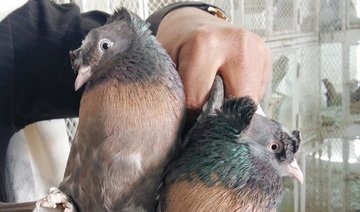DUBAI: As businesses in Saudi Arabia and the wider Gulf region strive for greater efficiency, innovation, and profitability, SAP’s generative artificial intelligence program, Joule, is set to revolutionize the way firms operate.
By integrating cutting-edge AI capabilities directly into business processes, the German software company aims to streamline workflows, enhance decision-making, and boost productivity across industries.
Ahmed Al-Faifi, senior vice president and managing director of SAP Middle East and Africa — North, emphasized the impact of AI on the region during remarks at the recent SAP Sapphire conference in Barcelona, Spain.

Joule, SAP’s natural language generative AI copilot, is designed to simplify tasks and improve outcomes. (SAP photo)
“The groundbreaking use of generative AI and the partnerships announced by SAP at Sapphire are particularly relevant to our region, where both the public and private sectors have embraced the digital transformation necessary to leverage AI technologies,” said Al-Faifi.
Joule, SAP’s natural language generative AI copilot, is at the heart of this transformation. Designed to simplify tasks and improve outcomes, Joule is expected to manage 80 percent of the most common tasks performed by SAP’s 300 million end users by the end of 2024.
This shift has the potential to increase productivity by 20 percent, offering significant benefits to businesses in the Gulf region.
The capabilities of Joule extend across various business functions, from finance and analytics to order management. Joule also provides strategic recommendations, leveraging SAP’s B2B data model to offer real-time insights that enhance cash collection, supply chain decisions, and procurement strategies.
This level of AI-driven support is particularly valuable in the Gulf, where businesses are navigating rapid growth and digital transformation.
Al-Faifi, a Saudi national leading SAP’s efforts in the region, highlighted the strategic importance of Saudi Arabia as a market.
“Amid this impressive and rapid digital evolution, it is imperative that we use AI in a way that will benefit our region’s businesses and communities,” he said.

Ahmed Al-Faifi, senior vice president and managing director of SAP Middle East and North Africa. (Supplied)
“From the outset, SAP pioneered AI solutions that are relevant, reliable, and responsible, and we remain committed to ensuring that the business AI infused across our portfolio adheres to these fundamental principles, while driving successful outcomes for public and private enterprises.”
SAP’s investment in Saudi Arabia reflects its commitment to this mission. Earlier this year, the company opened an SAP Experience Center in the Kingdom’s Eastern Province city of Alkhobar, designed to drive innovation with customers and partners.
In collaboration with the Ministry of Communications and Information Technology, SAP has also extended its Academy of Engineering program until 2025, further bolstering the country’s technological capabilities.

Last year, Saudi Arabia’s Ministry of Communications and Information Technology in collaboration with SAP Global launched a specialized training program aimed at qualifying national digital talent through both virtual and in-person journeys. (MICT photo)
Innovation is about leveraging knowledge about existing industries, Al-Faifi told Arab News. “For example, in the oil and gas sector, we are working with Saudi Aramco on innovation, specifically regarding maintenance.
“We are making sure that AI and technology are being used to help optimize the company’s maintenance. Of course, there is a business aspect here. We need to reduce costs or increase the time to revenue because maintenance means downtime.”
Al-Faifi also stressed the need for businesses to adapt quickly to the fast-paced advancements in AI.
“AI is challenging everybody. It is going too fast,” he said. “There are so many scenarios, so many capabilities available, and the regulation is still evolving. The major focus here for SAP AI is to help the customer adapt and consume the technology they have in a much easier way.”

Joule is a key tool in this adaptation process, acting as an adviser to clients and simplifying complex business processes to enhance efficiency and productivity. This comes at a crucial time for Saudi Arabia, where rapid growth and transformation are driving the need for innovative solutions.
“The transformation taking place in Saudi Arabia is very exciting,” said Al-Faifi. “We can leverage the use of AI in business to expedite projects and attract new ones. The SAP innovation center in Saudi is meant to help local projects learn how to go faster to realize their goals.”
As SAP continues to expand its AI capabilities, the Gulf region stands to benefit from more streamlined operations, faster project completion, and ultimately, a more competitive position in the global market.



































